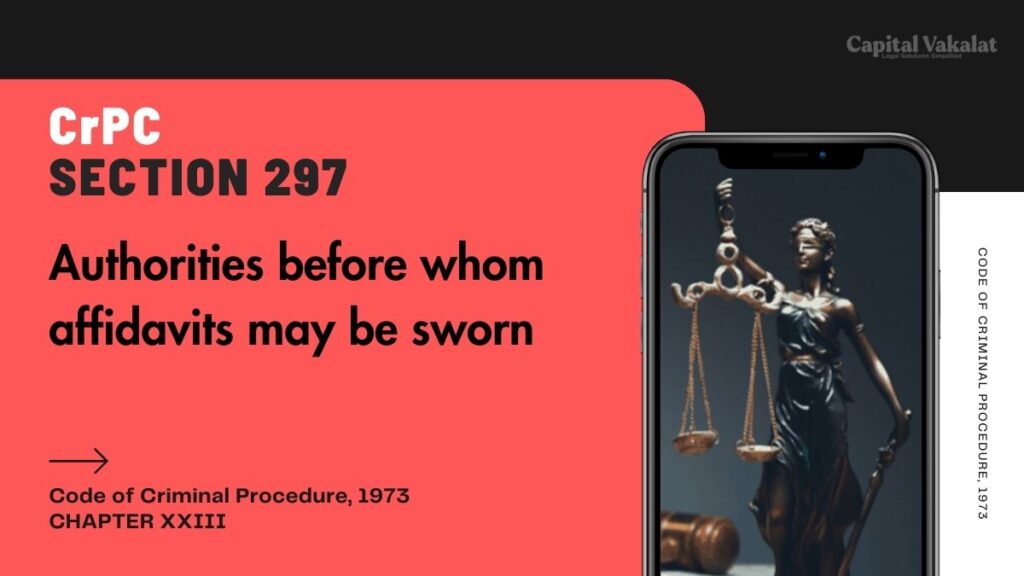Affidavits play a critical role in the judicial process, offering sworn testimony and evidence in written form. Understanding the legal parameters surrounding affidavits, especially regarding the authorities before whom they may be sworn, is essential for both legal practitioners and the general public. Section 297 of the Code of Criminal Procedure (CrPC) in India outlines these parameters with precision, ensuring clarity and legal consistency.

This article delves into Section 297 CrPC, exploring the authorities competent to administer affidavits, the implications of this provision, and its significance in the judicial system.
Bare Act. Section 297 Cr.P.C.
Authorities before whom affidavits may be sworn.
(1) Affidavits to be used before any Court under this Code may be sworn or affirmed before---
1[(a) any Judge or Judicial or Executive Magistrate, or]
(b) any Commissioner of Oaths appointed by a High Court or Court of Session, or
(c) any notary appointed under the Notaries Act, 1952 (53 of 1952).
(2) Affidavits shall be confined to, and shall state separately, such facts as the deponent is able to prove from his own knowledge and such facts as he has reasonable ground to believe to be true, and in the latter case, the deponent shall clearly state the grounds of such belief.
(3) The Court may order any scandalous and irrelevant matter in the affidavit to be struck out or amended.
1. Subs. by Act 45 of 1978, s. 22, for cl. (a) (w.e.f. 18.12.1978).
Understanding Section 297 CrPC
Section 297 CrPC specifies the authorities before whom affidavits can be sworn. This provision ensures that affidavits are administered by recognized officials, maintaining the integrity and authenticity of the sworn statements. The section includes detailed criteria and lists the competent authorities.
The Importance of Affidavits in Legal Proceedings
Affidavits are foundational in various legal processes. They serve as evidence, provide factual statements, and support applications and petitions. Given their significance, the process of swearing an affidavit must adhere to strict legal protocols to avoid any disputes over their validity.
Authorities Competent to Administer Affidavits under Section 297 CrPC
Section 297 CrPC enumerates specific authorities before whom affidavits can be sworn. These include:
- Judicial Magistrates
- Executive Magistrates
- Notary Public
- Oaths Commissioners
- Other authorized officers
Judicial Magistrates
Judicial Magistrates play a pivotal role in the administration of justice. As part of their duties, they are authorized to administer oaths and affidavits, ensuring that the statements made therein are legally binding.
Executive Magistrates
Executive Magistrates, often holding administrative responsibilities, also have the authority to administer affidavits. This inclusion extends the accessibility of affidavit services to a broader public.
Notary Public
Notaries Public are authorized by the government to perform various legal formalities, including the administration of affidavits. Their role ensures that the affidavits are executed in accordance with the law, providing a layer of legal verification.
Oaths Commissioners
Oaths Commissioners, appointed specifically for administering oaths and affidavits, are crucial in maintaining the legal sanctity of affidavits. Their involvement ensures that the sworn statements are executed with due process.
Other Authorized Officers
The law also permits other officers, authorized by the government, to administer affidavits. This provision allows flexibility and ensures that the process is not hindered by the unavailability of the aforementioned officials.
Procedure for Swearing Affidavits
The procedure for swearing affidavits involves several steps, ensuring legal compliance and authenticity. The deponent must appear before the authorized official, affirm the truthfulness of the statements, and sign the affidavit in the presence of the official, who then certifies the document.
Legal Implications of Sworn Affidavits
Sworn affidavits hold significant legal weight. Any false statement made in an affidavit can lead to perjury charges, emphasizing the importance of accuracy and honesty in these documents.
Significance of Section 297 CrPC in Ensuring Legal Integrity
Section 297 CrPC is vital for maintaining the integrity of the legal process. By specifying the authorities before whom affidavits may be sworn, the provision prevents unauthorized administration and potential misuse of affidavits.
Impact on Legal Practitioners and the Public
For legal practitioners, understanding Section 297 CrPC is crucial for advising clients accurately and ensuring that affidavits are validly executed. For the public, this knowledge empowers individuals to comply with legal requirements confidently.
Challenges and Considerations
While Section 297 CrPC provides clear guidelines, practical challenges may arise, such as the availability of authorized officials or the public’s awareness of the proper procedures. Addressing these challenges requires ongoing education and accessibility improvements.
Conclusion
Section 297 CrPC serves as a cornerstone in the administration of affidavits, ensuring that they are sworn before competent authorities and maintaining the legal integrity of the judicial process. Understanding this provision is essential for both legal practitioners and the general public, fostering compliance and upholding the rule of law.